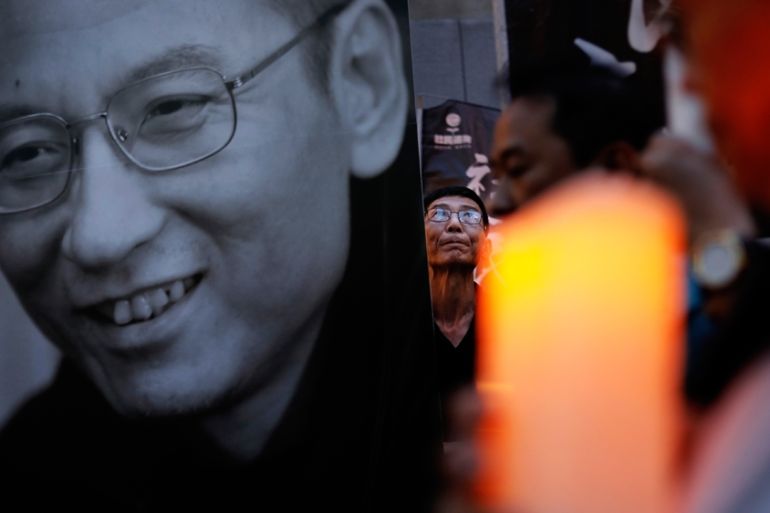Is China afraid of Liu Xiaobo’s legacy?
Nobel Peace Prize-winning dissident Liu Xiaobo is no more, but his writings and his ideas will survive.

“Liu Xiaobo? Yeah, I know who Liu Xiaobo is,” the airport security guard at the Shenyang airport told us as we made our way back to Beijing.
On a whim, we had decided to ask whether he knew about China’s Nobel Peace laureate.
Keep reading
list of 4 itemsEurope pledges to boost aid to Sudan on unwelcome war anniversary
Birth, death, escape: Three women’s struggle through Sudan’s war
Does Israel twist humanitarian law to justify Gaza carnage?
Just two days prior, Liu, who had been serving an 11-year sentence for subversion, had passed away from liver cancer – under police guard in a hospital in Shenyang.
The news on Thursday made headlines all over the world, but not in China.
Curious, we pressed the airport security guard for details. How had he heard about Liu Xiaobo?
|
|
“She’s a famous actress, isn’t she?” he said.
His answer should not have surprised us. Earlier we had conducted a straw poll on a busy street corner in Shenyang and came up empty.
A prominent dissident since the 1989 Tiananmen Square pro-democracy protests, Liu is almost unknown in China.
His name and writings have been scrubbed off the internet and blacked out on international news channels by China’s hard-at-work censors.
Our driver in Shenyang turned out to be the only one who knew who Liu was. Even then, it was only because he had friends who were police officers.
Those officers had been deployed on the streets of Shenyang, guarding the perimeter of the hospital compound where Liu was being treated.
The day after Liu’s death, when he had forever been silenced, they were still out on the streets of Shenyang.
READ MORE – Obituary: Liu Xiaobo
We had been filming the hospital exterior from across the street. Within minutes, three men in plain-clothes surrounded us and deliberately walked into our shots.
Ten minutes later, reinforcements arrived. There were now more than a dozen of them.
|
|
We continued filming what we could. Eventually, another man showed up, asked to see our IDs, then left.
The other men left us alone too but lingered nearby.
The next morning one of them was there again, sitting in the hotel lobby. He stepped outside as we got into our van, perhaps to make sure we were really leaving, more likely to let us know we were being watched.
But it also indicated the Chinese government was sensitive to news of Liu’s death.
In op-ed articles in state-owned media and in comments made by the foreign ministry spokesman, Liu was denounced as a criminal, a man who had been rightfully sentenced after a fair trial.
Pleas made by foreign governments to allow him to seek treatment abroad in his final days were criticised as interference.
READ MORE: Thousands march in Hong Kong to remember Liu Xiaobo
The Chinese government took pains to show the world it did not fear Liu, yet its actions suggested otherwise.
How else to explain the government handouts of photos of the funeral and burial ceremonies?
How else to explain the presence of plain-clothes security officers at his funeral, who seemed to outnumber family members?
Hu Jia, a rights activist and friend of Liu Xiaobo and his now widow, Liu Xia, told us, “Some of them are plain-clothes officers from Beijing. They’re from the police station that monitors Liu Xia’s neighbourhood. I know them.”
How else to explain the government-arranged press conference held a few hours after the cremation?
Liu’s older brother, Liu Xiaoguang, chose his words carefully. He thanked the government and explained why the family opted for a sea burial, something so at odds with Chinese tradition.
Liu Xiaobo is no more. But his writings and his ideas will survive. And perhaps that is what the Chinese government is afraid of.
|
|